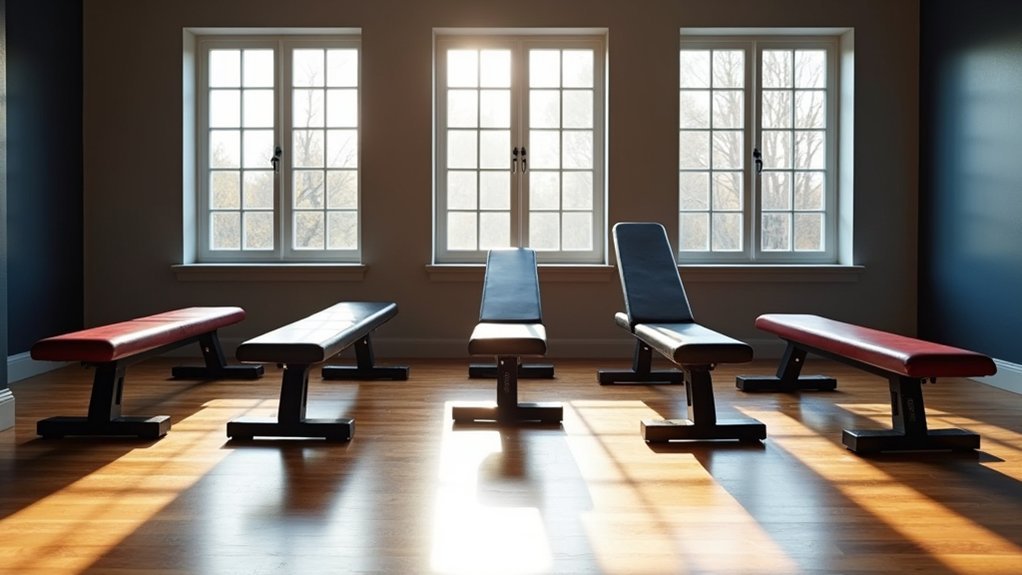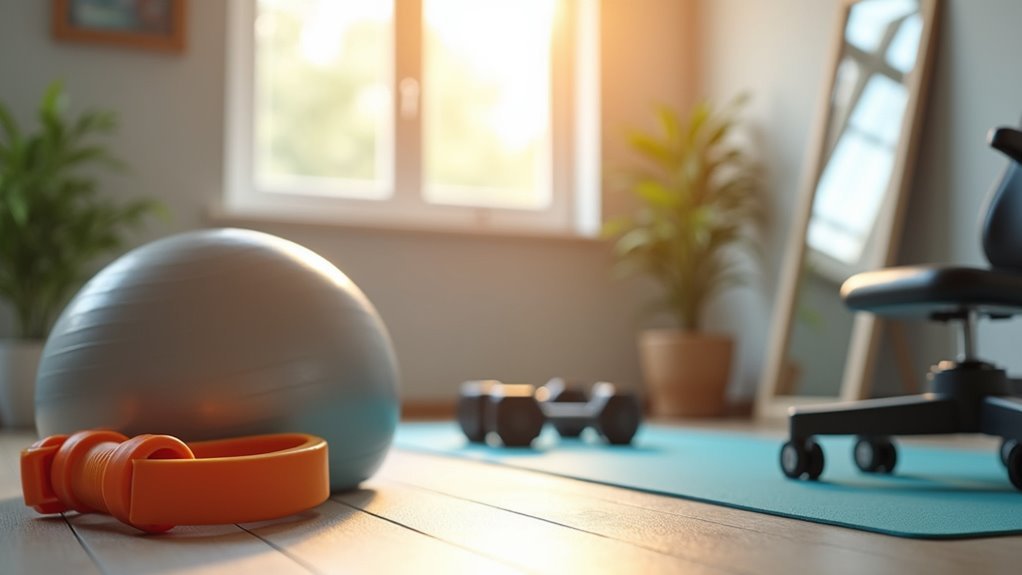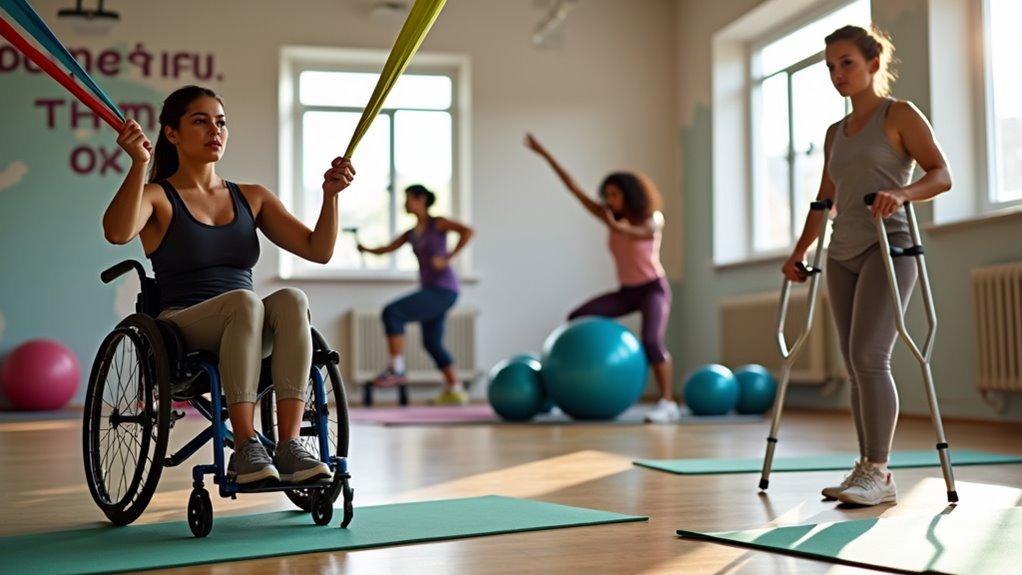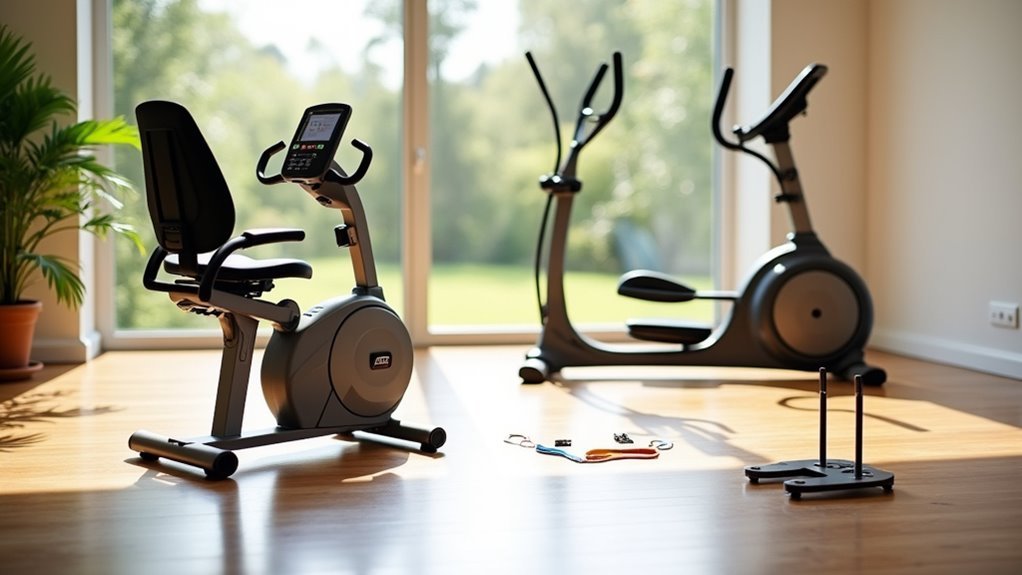As you approach your golden years, your workout equipment needs to evolve with you. Finding a bench that supports your aging back isn’t just about comfort—it’s essential for preventing injury and maintaining your fitness routine. The right bench can make the difference between consistent progress and painful setbacks. You’ll want stability, proper padding, and adjustability features specifically designed for mature bodies. Let’s explore five options that won’t let your back down when you’re ready to step up your game.
Keppi 1200LB Adjustable Weight Bench for Home Gym
For seniors seeking exceptional back support during workouts, the Keppi 1200LB Adjustable Weight Bench stands out with its 36+ setting combinations that allow personalized positioning for sensitive spines.
You’ll appreciate the 36-inch backrest covered in high-grade, sweat-proof leather that provides comfort during extended sessions. The heavy-duty commercial steel frame supports up to 1,200 pounds, ensuring stability for any exercise intensity. With 12 back pad positions and 3 seat angles, you can easily find comfortable positions that minimize strain.
Assembly takes just 10 minutes, and built-in wheels make repositioning effortless—perfect when you don’t want to strain your back unnecessarily.
Best For: Seniors and fitness enthusiasts with back concerns who need a highly adjustable, stable workout bench with multiple position options to accommodate sensitive spines while maintaining proper form during strength training.
Pros:
- Exceptional 36+ setting combinations with 12 back pad positions and 3 seat angles provide customized support for different body types and exercise needs
- Heavy-duty commercial steel frame supports 1,200 pounds with no wobbling, creating a stable platform for confident workouts
- Quick 10-minute assembly and built-in wheels make it convenient for seniors to set up and reposition without straining
Cons:
- At 55 pounds, the bench may be heavy for some seniors to move despite the built-in wheels and handle
- The 58.5-inch depth might require significant space in a home gym setup
- Some users may need to grease the adjustment knobs for smoother operation, adding an extra maintenance step
KeppiFitness Adjustable Weight Bench with Leg Extension and Preacher Pad
The KeppiFitness Adjustable Weight Bench offers exceptional support for those dealing with back sensitivity while still craving a complete strength workout. Its commercial-grade steel frame supports up to 1200 pounds, ensuring stability during your heaviest lifts.
You’ll appreciate the 12 backrest positions and 3 seat adjustments that let you customize workouts to your comfort level. The thick, firm padding prevents pressure points while providing necessary support for aging backs.
The versatile design includes removable leg extension and preacher pad attachments, making this an all-in-one solution for thorough strength training without sacrificing back protection.
Best For: Fitness enthusiasts with back sensitivity who need a versatile, heavy-duty weight bench that offers multiple position adjustments and integrated attachments for comprehensive strength training.
Pros:
- Exceptional weight capacity of 1200 lbs with commercial-grade steel frame ensures stability and safety during heavy lifting sessions
- Highly adjustable with 12 backrest positions and 3 seat positions allowing customized workout angles for comfort and targeted muscle engagement
- Includes versatile attachments (leg extension and preacher pad) that expand exercise options while maintaining proper form and back support
Cons:
- The preacher curl attachment has limited range of motion that may not be ideal for optimal bicep workouts
- Leg extension/curl attachment foam rollers may slide during exercises, potentially disrupting workout flow
- At 76 lbs, the bench is relatively heavy to move, though this contributes to its overall stability
RITFIT Adjustable Weight Bench for Home Gym
Aging fitness enthusiasts with back concerns will appreciate the RITFIT Adjustable Weight Bench’s impressive blend of support and versatility. The industrial-grade steel frame supports up to 1300lbs, while the 2.75-inch thick cushion covered in sweat-resistant leather provides comfort during extended workouts.
With 10 backrest positions and 3 seat angles, you’ll find the perfect setup for your specific back needs. The ergonomic design alleviates pressure points, allowing you to focus on proper form rather than discomfort.
Though some users report uneven feet causing stability issues, most reviewers praise its sturdiness and comfort—essential qualities when you’re working around back sensitivity.
Best For: Aging fitness enthusiasts with back concerns who need a versatile, supportive weight bench for home workouts that offers multiple adjustment positions and superior comfort.
Pros:
- Supports up to 1300lbs with industrial-grade steel construction, providing exceptional stability for users of all sizes
- Features 10 backrest positions and 3 seat angles to accommodate various exercises and individual comfort needs
- Includes a thick 2.75-inch cushion covered in sweat-resistant leather for comfortable extended workout sessions
Cons:
- Some users report uneven feet causing stability issues on certain surfaces
- Inconsistent manufacturing quality noted in customer reviews
- Despite having transport wheels, the solid steel construction may make it heavy and difficult to move for some users
Finer Form Multi-Functional FID Weight Bench
Versatility champions will find their match in the Finer Form Multi-Functional FID Weight Bench, a robust solution designed specifically for those with back concerns who don’t want to sacrifice exercise variety. This powerhouse supports over 100 exercises with 8 backrest positions that can be adjusted to your comfort level.
Built from alloy steel supporting 1,000 lbs, it’s remarkably stable for aging backs. The hyperextension feature specifically targets lower back strengthening—crucial for spinal health. You’ll appreciate the clear assembly instructions and transport wheels for easy storage.
With a 4.6-star rating from nearly 2,000 users, it delivers professional-grade support in a home-friendly footprint.
Best For: Fitness enthusiasts with back concerns who need a versatile weight bench that offers multiple exercise configurations while providing proper support and stability for strength training at home.
Pros:
- Exceptional versatility with support for 100+ exercises and 8 adjustable positions, making it ideal for comprehensive full-body workouts
- Heavy-duty construction supporting up to 1,000 lbs with hyperextension features specifically designed to strengthen the lower back and improve spinal health
- Convenient mobility with transport wheels and compact 5-foot footprint, making it practical for home gym setups with limited space
Cons:
- 90-minute assembly time may be challenging for some users, though instructions are clear and well-organized
- Padding, while comfortable, may wear out faster than commercial gym equipment according to some user feedback
- Limited decline options and preacher pad placement configurations might restrict certain specialized exercise variations
Yoleo Adjustable Weight Bench for Home Gym (Foldable, Incline/Decline)
For seniors seeking stability without sacrificing versatility, Yoleo’s Adjustable Weight Bench delivers impressive support with its robust 660-pound weight capacity. The heavy-duty alloy steel frame features a double-triangle structure that provides exceptional stability during workouts.
You’ll appreciate the 1.4-inch thick padding covered in PU leather that offers comfort for sensitive backs. With 84 possible position combinations, you can customize your workout to accommodate mobility limitations. When you’re finished, this 23-pound bench folds to just 31.5 x 12.6 x 13 inches—perfect for compact living spaces. The high 4.6-star rating from over 2,500 users confirms its reliability for aging fitness enthusiasts.
Best For: Seniors and older adults looking for a stable, adjustable weight bench that accommodates mobility limitations while offering versatility for a complete strength training routine at home.
Pros:
- Heavy-duty alloy steel frame with 660-pound weight capacity provides exceptional stability and safety for seniors during workouts
- 84 possible adjustment combinations allow for customized workout positions that can accommodate various mobility limitations and exercise needs
- Highly portable design at just 23 pounds with compact folding dimensions (31.5 x 12.6 x 13 inches) makes it ideal for homes with limited space
Cons:
- At 1.4 inches thick, the padding may not provide sufficient cushioning for seniors with joint sensitivity or pain during longer workout sessions
- Some users report the decline angle is steep, which could be challenging for older adults with balance or mobility issues
- Assembly requires attaching two pins, which might be difficult for seniors with limited hand strength or dexterity
Factors to Consider When Choosing the Most Supportive Workout Benches for Aging Backs
Choosing the right workout bench for an aging back requires attention to several key factors that can make or break your exercise experience. You’ll want to evaluate the bench’s padding thickness, adjustment positions, frame stability, and weight capacity to guarantee proper support during workouts. These considerations will help protect your spine while still allowing you to maintain strength and flexibility as you age.
Subheading Discussion Points for “Factors to Consider When Choosing Most Supportive Workout Benches for Aging Backs”
When it comes to protecting your aging back during exercise, selecting the right workout bench isn’t just about comfort—it’s vital for safety and effectiveness. Look for benches with thick, high-density foam padding that reduces pressure points where your spine contacts the surface.
Adjustability is important—choose a bench with multiple backrest and seat positions to maintain proper alignment during different exercises. Don’t compromise on materials; heavy-duty alloy steel frames provide the stability you’ll need, supporting higher weight capacities while preventing wobbling.
Ergonomic design features make a significant difference in back protection. The bench should contour to your body’s natural curves, alleviating stress on your spine. Finally, make certain your bench has a solid, wide base with anti-slip feet to eliminate any movement that could jar your back during workouts.
Proper Back Padding Thickness
Three critical inches can make all the difference between comfort and pain when it comes to workout bench padding for aging backs. You’ll want to look for benches with at least 2-3 inches of high-density foam that maintains its shape even after extensive use.
The ideal padding, such as those measuring 2.75 inches thick, provides excellent ergonomic support for your spine, ensuring neutral alignment throughout your workout. Don’t compromise on the upholstery either—sweat-resistant leather reduces friction and extends the padding’s lifespan.
For maximum comfort, pair proper thickness with adjustable backrest angles. This combination allows you to customize positions based on your specific body type and exercise needs, greatly reducing stress on your aging back during workouts.
Multiple Adjustment Positions
Multiple adjustment positions represent the backbone of versatility in any workout bench for aging fitness enthusiasts. With at least 10 different positions available in quality benches, you’ll be able to seamlessly shift between incline, decline, and flat exercises while maintaining proper spinal alignment. This customization is vital for targeting different muscle groups without compromising back health.
Look for benches with adjustable seat positions that accommodate your specific height and body type. This feature enhances stability during workouts and prevents unnecessary strain. Many supportive benches also include removable leg rollers or foot catches that provide essential stability during decline movements, protecting you from potential injuries.
Frame Stability Matters
The foundation of any reliable workout bench lies in its frame stability—particularly for those with aging backs. You’ll want to prioritize heavy-duty materials like alloy steel that won’t buckle under pressure. Look for thicker gauge steel frames (70*50mm or 2.7″*1.9″) that provide superior durability compared to thinner alternatives.
A bench’s base design considerably impacts stability. Features like anti-slip feet, triangular bases, and double bearing constructions prevent wobbling during exercises, creating a secure platform for your workouts. Pay close attention to weight capacity ratings—benches supporting around 1200 lbs typically indicate robust construction that will adequately support your body regardless of exercise intensity. Remember that investing in stability isn’t just about preventing equipment failure—it’s about protecting your aging back from unnecessary strain and potential injury.
Weight Capacity Needs
Selecting a bench with adequate weight capacity represents one of the most vital safety considerations for aging backs. You’ll want to choose a bench that supports both your body weight and any additional weights you’ll use during exercises, with quality options typically rated between 600-1300 pounds.
Don’t underestimate this specification—higher weight capacities provide significant stability that aging backs require. Look for benches constructed with heavy-duty steel frames, as they typically offer superior support and durability compared to lighter materials.
Consider your fitness journey ahead, not just your current needs. As you build strength and muscle mass, you’ll likely increase the weights you’re using. Remember to periodically inspect your bench for wear, especially if you’re consistently working near its maximum capacity limit.
Frequently Asked Questions
How Often Should Workout Benches Be Replaced for Safety?
You should replace your workout bench every 3-5 years or immediately if you notice wobbling, cracks, tears in upholstery, or structural damage. Don’t wait until it’s unsafe to upgrade.
Can Seniors With Recent Back Surgery Use Adjustable Weight Benches?
You shouldn’t use adjustable weight benches after recent back surgery without your doctor’s approval. They’ll determine when it’s safe to resume exercise and what modifications you’ll need for your specific recovery situation.
What Warm-Up Exercises Reduce Back Strain Before Bench Workouts?
You’ll benefit from cat-cow stretches, gentle spinal twists, and hip bridges before bench workouts. Don’t skip hamstring stretches and light cardio to warm up your muscles and reduce back strain risk.
Are Hydraulic Adjustment Mechanisms Better for Seniors Than Manual Ones?
Yes, hydraulic adjustment mechanisms are better for you as a senior. They don’t require physical strain to adjust, making them easier and safer to use when you’re changing positions during workouts.
Do Workout Benches Require Special Maintenance for Longevity?
Workout benches need minimal maintenance. You’ll want to wipe them down after use, check bolts periodically, and lubricate adjustment mechanisms. For hydraulic models, watch fluid levels. Keep benches clean and dry to prevent rust.





Leave a Reply